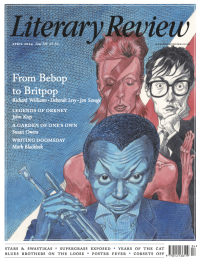Rosa Lyster
Two Sides to the Story
The Fine Art of Literary Fist-Fighting: How a Bunch of Rabble Rousers, Outsiders, and Ne’er-do-wells Concocted Creative Nonfiction
By Lee Gutkind
Yale University Press 304pp £25
This is a true story. Straight after finishing university, the man who is now my husband spent a short time as an intern in the office of the publication you are reading. His fellow intern was a sixteen-year-old boy, furiously annoyed about being there and subject to periodic check-ins from his headmaster. The name of this boy was Richard. My husband and his sixteen-year-old colleague spent their days going through the dozens of books that arrived every morning, sorting them into piles. If I had more space to flesh out this scene, I would include a long paragraph describing them rustling uneasily through shards of cardboard, dust motes swirling in the air, Richard remarking that he had never known a man to drink Diet Coke before.
Richard and my husband came quickly to fear this job. ‘That’s non-fiction,’ my husband would say, pointing to a book about wine. ‘What’s non-fiction?’ Richard would say, exasperated – by the exercise, by the idea of someone reading a book about wine, by publishing itself, maybe. ‘Non-fiction’, my husband would say, ‘is when it’s not made up.’ ‘So everything in this book is true?’ Richard would say, pointing to the volume at the top of the non-fiction pile, Craig Brown’s book about Princess Margaret. ‘It’s more like it’s trying to be true,’ my husband would say. ‘What?’ Richard would say. ‘It’s more like it aspires to the status of non-fiction but uses techniques we associate with the novel,’ my husband would have said, if he had been able to come up with such a definition on the spot. ‘What?’ Richard would have said.
The harder my husband tried to distinguish between these categories, the less sense his explanations made to himself and the more irritable Richard became. My husband found himself tormented by a mocking inner voice as he came to realise he did not know the answers to what he had

Sign Up to our newsletter
Receive free articles, highlights from the archive, news, details of prizes, and much more.@Lit_Review
Follow Literary Review on Twitter
Twitter Feed
Under its longest-serving editor, Graydon Carter, Vanity Fair was that rare thing – a New York society magazine that published serious journalism.
@PeterPeteryork looks at what Carter got right.
Peter York - Deluxe Editions
Peter York: Deluxe Editions - When the Going Was Good: An Editor’s Adventures During the Last Golden Age of Magazines by Graydon Carter
literaryreview.co.uk
Henry James returned to America in 1904 with three objectives: to see his brother William, to deliver a series of lectures on Balzac, and to gather material for a pair of books about modern America.
Peter Rose follows James out west.
Peter Rose - The Restless Analyst
Peter Rose: The Restless Analyst - Henry James Comes Home: Rediscovering America in the Gilded Age by Peter Brooks...
literaryreview.co.uk
Vladimir Putin served his apprenticeship in the KGB toward the end of the Cold War, a period during which Western societies were infiltrated by so-called 'illegals'.
Piers Brendon examines how the culture of Soviet spycraft shaped his thinking.
Piers Brendon - Tinker, Tailor, Sleeper, Troll
Piers Brendon: Tinker, Tailor, Sleeper, Troll - The Illegals: Russia’s Most Audacious Spies and the Plot to Infiltrate the West by Shaun Walker
literaryreview.co.uk